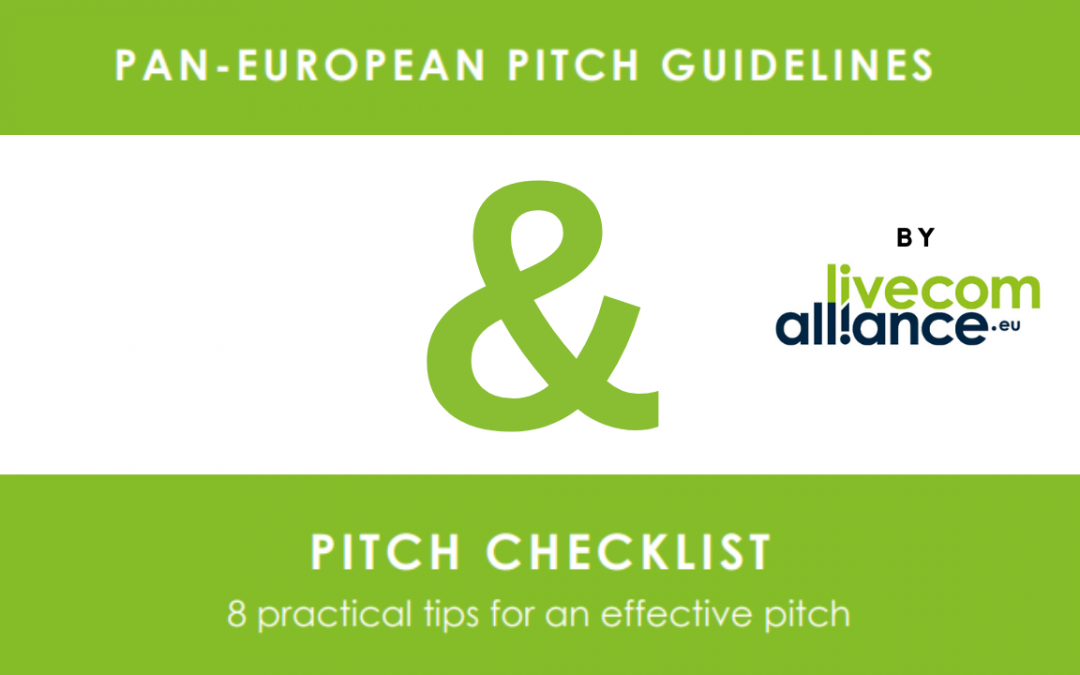Our Partner, LiveCom Alliance have put together some invaluable guidelines for pan-European pitching! In the live communication industry, calling for or entering in pitches is a common way of generating business, and it needs to be treated as a delicate matter. The stakes are high. On the one hand for the client because it determines the potential value of a future partnership, and on the other hand for the agency since it could define the potential of winning a new client or project.
Therefore, professional pitch guidelines are essential to guarantee best possible results on both ends.
A set of guidelines will enable clients to adopt to a more professional and effective approach in their call for pitches whilst agencies will be able to objectively weight the investment involved against the chances of success.
Pitch Guidelines
- Clear scope: The client makes clear in the invitation whether it’s a pitch for an individual project or for a multi-year relationship. Detailed information is provided about the nature and scale, as well as a realistic budget forecast. It’s also important to mention whether it’s a creative, strategic or production pitch or whether it’s a combination of these.
- Transparent process: In the pitch invitation, the client proposes a clear and transparent process that will remain unchanged throughout and guarantees equal opportunities for all participants. It’s important for agencies to know which other agencies they’re up against, and ideally
limited to a maximum of 3 to 5 agencies.
The client also stipulates the nature and scope of the pitch as well as briefing, deliverables, timing and presentation methods.
There is also information on the assessment criteria and decision-making procedure and states those involved. Requirements and criteria are relevant and relative to the nature and scope of the assignment. - Realistic remuneration: the costs incurred for the submission of a professional pitch by all invited agencies are covered (in part) by a pitch fee. This fee is announced in advance and is in proportion to the requested performance.
The winning agency is allowed to incorporate a realistic concept fee in the final budget. - Respect for copyright:The copyright applying to the ideas presented, remains the property of each invited and presenting agency and buy off of these rights is not covered by any paid pitch fee. The questions of copyright for the winning agency is governed by their contractual agreement(s) with the client.
- Confidentiality: All parties entering a pitch process (both agencies & clients) shall treat all information shared during the pitch process with strict confidentiality. Clear, written agreements are made with regard to (any) press contacts.
Pitch Checklist
8 practical tips for an effective pitch
Pitching is a fine art. The stakes are high and the amount of time and knowledge that is invested is considerable. Both by agencies and by clients. The LiveCom Alliance Pitch checklist serves to map out an effective approach.
- Be clear about the nature of the commission: Is it a one-off project or a long-term relationship? Both situations call for their own methods and require specific approaches. Be clear in this respect with the pitching parties beforehand.
- New isn’t always better: Whether it’s the need for a breath of fresh creative air or standard procedures within organisations. There are various reasons for writing a pitch. Are you on good terms with your current agency? Then definitely involve them in the pitch. You’ll be
amazed at the new insights that can blossom. - Choose wisely: It isn’t easy to make a well-considered choice from the overwhelming array of agencies and companies. In the field of live communication, the national members of our participating associations offer proven craftsmanship and know-how.
- Prepare a pitch thoroughly: Make a pre-selection of agencies that you really want to work with. In doing so, you can look at the agency’s track record and its DNA, specific expertise
and references. We recommend that you enlist the services of three agencies at the most. If your longlist is longer, then get acquainted with the contenders and then draw up a top 3. - A good briefing is half the battle: Every pitch starts with a coherent and thorough briefing with clearly formulated questions and objectives. With these raw materials, an agency hits the drawing board and comes up with a concept idea. The briefing definitely contains a budget indication. This serves as a clear indication of the level of ambition and generates realistic ideas.
- Go for live (contact): At LiveCom Alliance we like live. If people don’t meet each other, a certain connection is lost. We strongly prefer a personal presentation of the briefing. And also, schedule a live meeting for agency presentations. Needless to say, ensure that the right contacts are at the table at the right time.
- Be transparent: Be clear about what you expect from pitching parties. Explain how the procedure works in advance and which assessment criteria you plan to use. If something changes during the process, then share this immediately with all parties.
- Offer appropriate pitch fees: Fair commissioning is key. Agencies invest heavily in time and resources. Realistic pitch fees for unsuccessful agencies are appropriate. Inform pitching parties of this fee before the pitch starts and ensure that it is in proportion to the performance requested.
Read the full LCA Pitch guide here
Source: LiveCom Alliance


